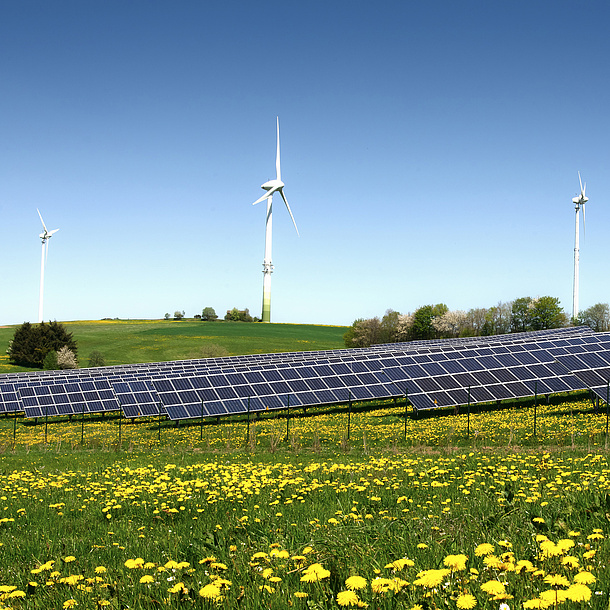Quick Facts
- Duration of study: 6 semesters
- ECTS credit points: 180
- Academic degree: Bachelor of Science (BSc)
- Language of instruction: German
The Bachelor's Programme
In this degree programme, you will acquire sound knowledge in the subject areas of chemistry, physics, systems science, earth sciences and chemical and process engineering. In addition, you will be encouraged to develop an interdisciplinary perspective towards human-environment systems and learn how to use computer-aided tools to describe networked systems.
Because you are allowed to select individual electives, you can focus on scientific-technical, systems science, but also economic and social aspects.
The practical aspects are also not neglected in the degree programme. By taking part in industry excursions, you have the chance to gain exciting insights into the practical aspects of the business, as well as carry out practical tasks as part of an interdisciplinary internship. In this internship, you will work together with students from other environmental system science degree programmes at the University of Graz, analyse problems and work out the solutions together.
Play video
Studying Environmental System Sciences / Natural Science - Technology
Focus Areas
You have the opportunity to specialise in the following areas:
Interdisciplinary Module: You will become more aware of interdisciplinary considerations and work together with colleagues from other environmental systems science degree programmes. You will learn how to recognise the multidimensional nature of complex problems, to evaluate them in analyses and to develop adequate solutions.
Systems Sciences: You will become familiar with formal scientific approaches taken to work with complex systems and receive a solid education regarding the mathematical and computer-based tools used in practice.
Mathematics and Statistics: You will receive a solid education in mathematics and statistics, e.g. learn how to work effectively with models.
Introduction to Physics: You will explore fundamental problems in physics, and especially in the fields of mechanics, heat, vibrations, waves, electricity and optics, and also carry out practical laboratory work.
Introduction to Chemistry: You will acquire an understanding of basic chemical laws, learn how to use the technical chemical terminology and explore interactions in chemical reactions in practical laboratories.
Introduction to Chemical and Process Engineering and Electrical Engineering: You will learn about process development, plant design and process monitoring in industrial plants. In addition, you acquire basic knowledge about electrical energy management and thermodynamic concepts.
Earth Sciences and Environmental Analysis: You will learn about chemical processes that take place in the outermost layer of the Earth and receive an introduction to environmental analysis, e.g. you will carry out evaluations of forms of alternative energy, such as wind power and photovoltaics.
Climate, Environment and Chemical Technology: Among other things, you will have the chance to learn more about the structure, composition and dynamics of the Earth's atmosphere. You will gain an understanding of the role of humans in current climate change and both understand and address fundamental problems in climate research.
Environmental Change or Chemical Technology: You can choose the module “Environmental Change and Precautionary Measures” or the module “Chemical Technology”.
Computer-supported Data Processing and Electronics: You will learn how to solve simple electronic problems with the help of a computer and, for example, how to collect and evaluate environmentally relevant data using a computer.
Physical Properties of Material: You will learn about the atomic structure and structural properties of matter and learn how the quantum world and everyday technical applications are connected.
Study counselling: Check what you expect!
What will I have to do in the first semesters? How much practice can I expect? And what can I actually do with my degree when I've finished? Check what you expect!
A student and a lecturer will take time for all your questions and you will get to know TU Graz during on-site appointments. Up to 10 persons can participate at each date.
Contact: lse@tugraz.at

I recommend the Bachelor's Programme to everyone who is enthusiastic about the natural sciences and wants to receive a broad education in areas that are environmentally relevant. Plus, the degree programme has a unique status throughout Austria and provides career options in both research and industry.
Maximilian Liebminger is a scholarship holder of the talent support programme TU Graz 100.
Environmental Systems Science in Research and Industry
Man-made climate change is one of the biggest problems of our time. Threats of uncontrollable warming exist, accompanied by storms and floods. The sustainable use of resources, renewable energies and how they are embedded in energy supply systems, waste treatment and recycling as well as water management have led us to develop central, state-of-the-art questions. The Department of Environmental Systems Science can provide appropriate answers to these questions and can provide significant help during the development of sustainable solutions.
At the “Wegener Center for Climate and Global Change”, for example, researchers working in fields such as geophysics and climate physics, meteorology, economics, geography and regional research all work together under one roof. Their research interests range from the observation, analysis, modelling and prediction of climate and environmental change, to climate impact research and the analysis of the role of humans as contributors, co-causers and co-shapers of this change.
Admission
Admission Requirements
Requirements for admission to a bachelor's degree programme at TU Graz
Admission Deadlines
Summer semester 2025
Admission period: 7 January to 5 February 2025
Winter semester 2025/26
Admission period: 7 July to 5 September 2025
Admission Procedure
Questions about admission?
Contact study@tugraz.at
Perspectives for Graduates
Professional Fields
Graduates of the Bachelor’s Degree Programme in USW NAWI-TECH are qualified to continue their studies in various master’s degree programmes, on the one hand, and to begin their careers in public service, in industry, or in the private sector, on the other hand:
- environmental analysis and environmental monitoring,
- sustainable material and energy use of raw materials,
- use and optimisation of resource- and energy-saving technologies,
- projects that address geological/earth science issues,
- evaluation and preparation of strategies and measures to address climate and environmental problems,
- waste management,
- the energy sector,
- training and continuing education and
- consulting.
Advanced Master’s Degree Programmes
After completing the bachelor's degree programme, you can enrol in the following master’s degree programmes without further requirements:
- Environmental Systems Sciences / Climate and Environmental Monitoring
- Green Process Engineering
- Advanced Materials Science
Information on other master's degree programmes with requirements you can find on the respective pages for the master’s degree programmes.
In addition, the bachelor's degree offers you the opportunity to apply internationally for master's degree programmes.





